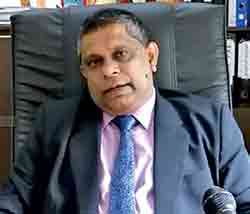Tuesday Feb 17, 2026
Tuesday Feb 17, 2026
Thursday, 23 October 2025 01:25 - - {{hitsCtrl.values.hits}}
 |
| University of Peradeniya Economics Professor Wasantha Athukorala |
The Government must accelerate reforms in its land, labour, and capital markets, key factor markets that drive investment, while sustaining the slowdown in domestic debt accumulation, University of Peradeniya Economics Professor Wasantha Athukorala said, noting that improved fiscal discipline has begun to stabilise the country’s borrowing trajectory.
Commenting through the Department of Government Communication, he said the increase in total debt since January 2025 has been minimal, signalling a stabilisation in borrowing trends.
Sri Lanka’s total public debt stood at Rs. 29,634 billion as of June 2025, comprising Rs. 18,806 billion in domestic debt and Rs. 10,800 billion in external debt, according to Prof. Athukorala.
He cautioned that some analyses of debt trends are misleading when external and domestic debt are compared in the same denomination.
“Either both are analysed in rupees or both in foreign currency terms. Mixing the two creates distortions because of exchange rate effects,” he said, explaining that the external debt stock itself does not change, but currency conversion adds volatility.
He noted that domestic debt growth, which had previously surged at unprecedented levels, has now eased significantly.
“From 2019 to end-2024, domestic debt increased by over Rs. 100 billion a month, peaking at Rs. 327 billion a month in 2022,” he said.
“By contrast, in the first six months of 2025, it has grown only by about Rs. 49–50 billion a month. This is a positive development because the country has been able to contain debt growth that was once above Rs. 300 billion per month.”
Domestic debt, which increased by nearly Rs. 4,000 billion in 2022 and Rs. 2,018 billion in 2023, grew by Rs. 1,258 billion in 2024. By end-June 2025, the increase was limited to Rs. 296 billion year-to-date.
“We must reduce this further. Growing domestic debt increases the future burden on citizens and risks destabilising the economy,” Prof. Athukorala said.
Locked out of international capital market borrowings since Sri Lanka’s debt default, he added that external borrowing has been confined to multilateral and limited bilateral sources.
“If we can continue to restrain domestic debt expansion while keeping external borrowing disciplined, the country could head toward greater macroeconomic stability,” he observed.
Turning to foreign direct investment (FDI), Prof. Athukorala said inflows have long fallen short of expectations, with annual levels barely reaching $ 1 billion over the years.
He attributed this to structural weaknesses in the capital, land, and labour markets and Sri Lanka’s low ranking on ease-of-doing-business indicators compared with regional peers.
However, he noted improving trends in 2025, with the Board of Investment (BOI) approving 81 projects worth $ 861 million between January and August, expected to generate over 20,000 jobs.
Of the approved investments, 57% are in manufacturing, 14% in construction, 9% in garment manufacturing, and 4% in the knowledge economy.
India accounted for 55% of total FDI approvals, followed by Singapore with 27%, China with 10%, and smaller inflows from the United States.
“If this trend continues, we can expect FDI to exceed $ 1 billion in 2025,” he said.
Prof. Athukorala stressed that this level remains inadequate to drive long-term growth.
“Over the next five years, Sri Lanka should aim for annual FDI inflows of around $ 5 billion, especially into new-age technologies and IT. But we must first understand and remove the barriers that deter investors. The Government must act fast, attracting more FDI will create jobs and expand export earnings,” he said.